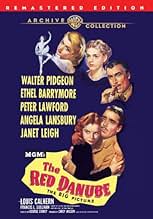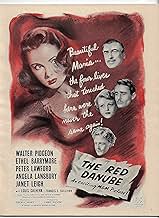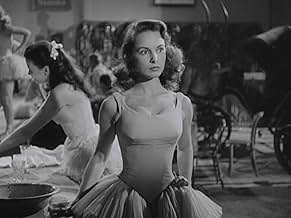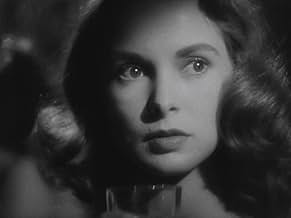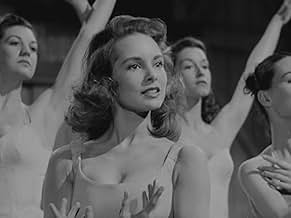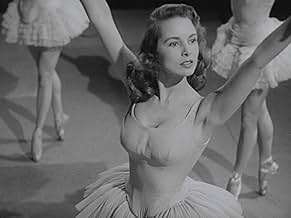Ajouter une intrigue dans votre langueShortly after the end of World War II, British Colonel Michael S. "Hooky" Nicobar (Walter Pidgeon) is assigned to a unit in the British Zone of Vienna. His duty is to aid the Soviet authorit... Tout lireShortly after the end of World War II, British Colonel Michael S. "Hooky" Nicobar (Walter Pidgeon) is assigned to a unit in the British Zone of Vienna. His duty is to aid the Soviet authorities to repatriate citizens of the Soviet Union, many of whom prefer not to return to their... Tout lireShortly after the end of World War II, British Colonel Michael S. "Hooky" Nicobar (Walter Pidgeon) is assigned to a unit in the British Zone of Vienna. His duty is to aid the Soviet authorities to repatriate citizens of the Soviet Union, many of whom prefer not to return to their home country. Billeted in the convent run by Mother Auxilia (Ethel Barrymore), Nicobar, a... Tout lire
- Nommé pour 1 oscar
- 5 victoires et 1 nomination au total
- Lt. Guedalia-Wood
- (as David Hydes)
- Major
- (uncredited)
- Devout Pilgrim
- (uncredited)
Avis en vedette
The following comments by "choosy" (from Seattle WA US) are, for the most part, accurate: "The other comments miss the point completely--the focus in the novel was not Cold War propaganda but the facts of the insane policies of the US and British in their respective zones of occupation in Germany and Austria to forcibly remove or return Eastern Europeans, not just Soviet citizens, even including ethnic Germans, most of whom had endured untold horrors trying to escape to the west, safety, and 'freedom' at the end of the war. That was the bemused Walter Pigeon's problem, not 'war guilt' but having to 'obey orders.' " (...AFTER the war.) "Most expellees were anti-Soviet, which is why they had escaped to the west to begin with, and thus went back to a certain death. It wasn't a small part of history--it was one of the biggest Allied mistakes and betrayals, and there were many, of the Occupation."
Here "choosey" has a reasonably solid handle on events, regardless of the novel or the movie. But the following of "choosy's" comments are off-base, primarily because he does not consider the whole picture. "The fact that this forceful expulsion was done because the Allies a. did not want to feed and care for refugees, and b. did want to curry favor with the Soviets at that pre-Berlin Blockade period makes the history even more poignant." The US Army (including the British Army) at that time was actually TWO armies in transition, as the combat forces who had fought their way across Europe to war's end gradually turned their functions and responsibilities over to a fresh Occupation Army - fully prepared to address whatever was needed in the immediate post-war period in their respective zones of responsibility. Not wanting to feed or care for the refugees or concern about currying favor with the Soviets simply did not enter the equation, nor was there any need to; this is pure revisionism. There were diplomatic protocols signed by the highest levels of all involved governments before the war ended; it was the duty of the soldiers of those respective governments to comply with those protocols, most of which at the time they were signed had solid rationale.
The policies mentioned in "chosey's" comments above were, in fact, in full agreement with procedures to which the Allies (US, GB, France and Russia) had worked out prior to the end of the war. Similar procedures were required of the Russians in repatriating "displaced citizens" to their proper homes in the west. Russia was seen during the war as a co-equal partner in the overall war effort on the European continent, and US combat forces (Patton's army), in fact, actually withdrew from forward positions they had reached in Austria and Czechoslovakia so that those regions could be turned over to Russian forces as per previous agreement concerning post-war occupation. (The US and UK could not have won the war in Europe without Russian participation, but all nations always exact a price for their cooperation. Russia under Stalin was no different.)
It rapidly became apparent, however, that Russia and its military, if not its political leadership, had very deep-seated scores to settle with those population groups who were seen as having fought against Russian forces, and thus had caused such horrendous spilling of Russian blood. (Probably the most confusing group was the Ukrainians - who had repeatedly been forced to turn and fight their previous "partners", back and forth, and even each other, during the ever shifting circumstances of the war in the Ukraine.) Russian rule in the zones over which they had control after the war very rapidly became quite ruthless, and it quickly became apparent to everyone that the KGB was, in fact, calling all the shots. There is also considerable evidence that the KGB was executing policies dictated by Stalin himself. Still, US and British military personnel stationed adjacent to the Russian zones or as liaison personnel were required to assist with the "resettlement" or "repatriation" procedures - which caused considerable internal turmoil among those men that lasts to this day.
On the other hand, there were also (fewer) numbers of people we were trying to repatriate from the Russian zones in the East to their proper homes in the West, including those warehoused in concentration camps and prisoner of war stockades. In order to accomplish that, we had to demonstrate some degree of reciprocity.
These things were, and remain, simple facts of history. War, and its aftermath, is rarely as neat and tidy as after-the-fact armchair generals would prefer. War is always, at best, a series of compromises and constantly changing circumstances. The procedures depicted in the movie had nothing at all to do with "feeding the red scare, the rise of McCarthyism, or as propaganda" to use somewhere else in the world. These days we ALL seem to use events for our own particular agendas, simply by putting some twisted ignorant spin on them, or by creating asinine cause-and-effect scenarios to best suit our own purposes. No one stops to consider that any two-bit twit can throw cheap stones from the very safe sidelines, and what is safer than the distance of a half century? But, in the end, facts are facts. The major events shown in the movie happened. Do with them what you will, but I prefer to keep them as they actually were - simple reality, facts of life, consequences of war.
As a life-long intelligence/liaison/diplomatic ground force professional, veteran of several wars, student of military history, who also served in Occupied West Berlin for five years watching good people die trying to get over The Wall to the West, I am .... Old Soldier
I found others' comments on the relationship to McCarthyism and/or anti-Communism in general to be interesting. I do believe this movie showed the evils of the Soviet system, which to me, is fine. I have no idea if it fed McCarthyism, since I wasn't alive during that period. However, to me, it seems to be more about anti-totalitarianism of all stripes, rather than merely anti-Communism. In particular, the scene of the refugees in boxcars seems to be a direct reference to the Holocaust.
That The Red Danube was nominated for best art direction speaks, as well, to the technical beauty of this black & white film. This film reminded me of The Third Man, in its location, art direction, and storyline. (Orson Welles always said that "Black & white is the actor's friend" -- how true, in both these movies!) Although this film is inferior to The Third Man overall, in terms of its acting, atmosphere, and skill of the director, it is still worthy of viewing. Whereas The Third Man focuses on the moral dilemma of dealing with the evil in one individual (in a corrupt society), this film deals more generally with the morality of living in a corrupt society. In other words, The Third Man asks: "Why do men turn evil in an evil society?" (which, when you think about it, may not be such a profound question; although the further question of "What can be done about it?" is also explored), whereas The Red Danube asks: "How can men stay good in an evil society?" (which is really a much more useful question). So, although there's no denying that The Third Man is the better movie overall, I would highly recommend The Red Danube due to its high production values, the collection of wonderful actors in its ensemble cast, and a very engaging, philosophical script.
Le saviez-vous
- AnecdotesKonstantin Shayne (Professor Bruloff) and Tamara Shayne (Helena Nagard) play husband and wife; in reality are siblings.
- GaffesMelville Cooper's role is credited as "Private David Moonlight", but his uniform bears Sergeant's stripes throughout the movie.
- Citations
Mother Superior: [Referring to a previous conversation about religion and its inefficacy in wartime] Like that ladder...
Col. Michael S. 'Hooky' Nicobar: The ladder?
Mother Superior: There is the ladder, there is the ceiling and there is the paint. If you want the ceiling painted, someone must climb the ladder.
Col. Michael S. 'Hooky' Nicobar: Yes, you, um, need a painter.
Mother Superior: But suppose the painter remains at the foot of the ladder? You cannot say that the ladder has failed you, or the paint has failed you, or the ceiling has failed you.
Col. Michael S. 'Hooky' Nicobar: No, no you can't.
Mother Superior: I know about you more than you know about yourself. You want the ceiling painted but... all the cruelty in the world, all the horror and tragedy you see, these you do not oppose with your own courage. You do not try to replace them with your own high hopes for the world and the human race. You complain that God has failed you. No, my friend. God has not failed man- man has failed God. For every man knows what God wants him to do.
- ConnexionsFeatured in Some of the Best: Twenty-Five Years of Motion Picture Leadership (1949)
- Bandes originalesOn the Atchison, Topeka and the Santa Fe
(uncredited)
Music by Harry Warren
[Instrumental version played at the tavern in Rome when Audrey and Twingo say goodbye]
Meilleurs choix
- How long is The Red Danube?Propulsé par Alexa
Détails
Box-office
- Budget
- 1 961 000 $ US (estimation)
- Durée
- 1h 59m(119 min)
- Couleur
- Rapport de forme
- 1.37 : 1



